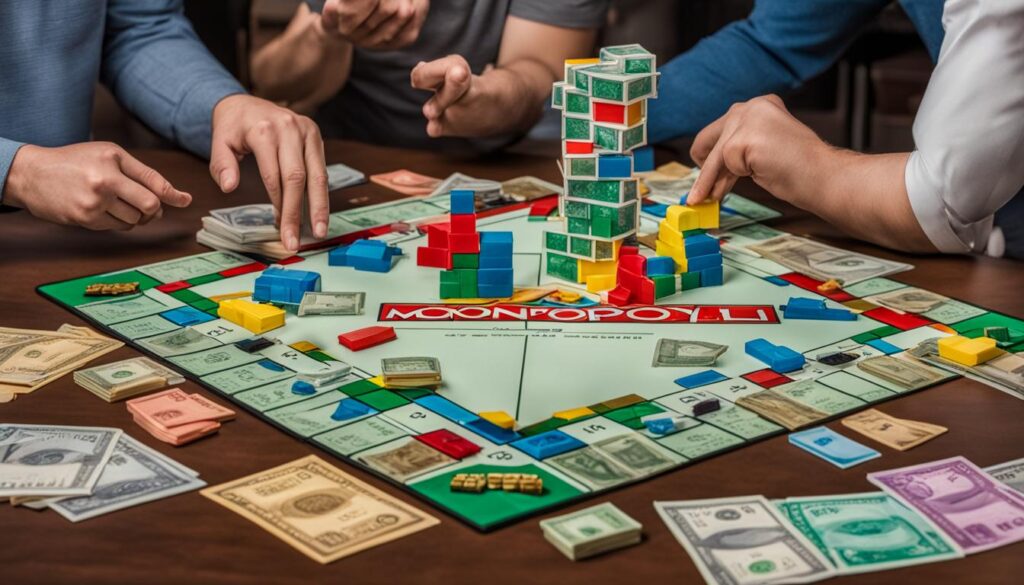If you’re a fan of the classic board game Monopoly, you know that owning properties and collecting rent are essential elements of gameplay. But did you know that selling your houses can also be a strategic move? By understanding the rules and techniques of selling houses in Monopoly, you can maximize your profits and gain an advantage over your opponents.
Throughout this guide, I will provide you with a comprehensive overview of the process of selling houses in Monopoly. We’ll start by exploring the concept of property ownership in Monopoly, the role of houses in the game, and the official rules of selling houses. I’ll also share effective strategies and tips for selling houses and avoiding common mistakes that can hinder your success.
So, if you’re a Monopoly enthusiast looking to enhance your property trading skills and increase your chances of victory, read on to master the art of selling houses in Monopoly.
Table of Contents
ToggleKey Takeaways:
- Selling houses in Monopoly can be a strategic move to maximize profits.
- Understanding the rules and techniques of selling houses is essential to gain an advantage over opponents.
- Explore the rules of property ownership in Monopoly and the role of houses in the game.
- Effective strategies and tips can help you avoid common mistakes and be successful in selling houses.
- Choosing whether to sell or invest in properties is a balance that you must understand to be successful.
Understanding Monopoly Property Ownership
Before I delve into the intricacies of selling houses in Monopoly, let’s first understand the concept of property ownership in the game.
In Monopoly, players acquire properties by landing on unowned spaces or by trading with other players. Each property has a title deed, which shows the name of the property, the purchase price, the mortgage value, and the rent that must be paid when other players land on the space.
As the owner of a property in Monopoly, you have the option to develop it by building houses and hotels on it. Doing so increases the rent that other players must pay when they land on the space.
It’s important to note that each property has its own set of rules and restrictions regarding ownership, development, and sale. For example, you cannot build houses on a property unless you own all of the properties in the same color group.
Now that we understand the basics of Monopoly property ownership, let’s move on to the rules of selling property in Monopoly.
The Role of Houses in Monopoly
Houses are a key component of Monopoly gameplay, as they enable players to increase the value and potential income of their properties. According to Monopoly house rules, a player can purchase a house once they own all the properties in a color group. Each property in a color group must have one house before moving onto the next property in that group. The cost of building houses on properties increases with each additional house added.
Once houses are built, the rent for that property increases significantly, allowing the player to earn more money from their opponents. For instance, if you land on a property with two houses, you will pay twice the rent as compared to landing on a property with no houses. These factors make understanding and applying rules related to Monopoly houses critical to winning the game.

Buying and Selling Houses in Monopoly
Players can buy and sell houses between turns, as per the monopoly house rules. In addition, it is also possible to mortgage a property with houses to quickly acquire cash. Keep in mind, however, that players cannot sell houses to other players if they still have mortgaged properties.
Understanding the rules and technical aspects of houses in Monopoly is crucial to developing a winning strategy. It enables players to make informed decisions on buying and selling houses and avoid common pitfalls that can hurt their chances of winning, such as putting too many houses on a property too soon, or neglecting to build houses entirely.
Can You Sell Your Houses in Monopoly?
As a Monopoly player, you might be wondering if it’s possible to sell your houses. Well, the answer is yes! According to the official rules of the game, players can sell their houses back to the bank at any time.
However, there are some conditions. You cannot sell your houses if you have mortgaged properties. In addition, when you sell your houses, you will only receive half of the original purchase price. For example, if you bought a house for $50, you will only receive $25 back when you sell it.
It’s also worth noting that houses must be sold back to the bank. You cannot sell them to other players directly, as this would go against the rules of the game.
If you are interested in selling your houses, it’s important to weigh the pros and cons. While selling your houses can free up cash and help you pay off debts or invest in other properties, it can also reduce your income and make it harder to win the game. Ultimately, the decision to sell your houses should be based on your overall strategy and goals.
Selling your houses can be a valuable tool in your Monopoly game plan. The official rules allow for it, but make sure you understand the conditions and weigh the risks before making a move. In the next section, I will share some effective strategies for selling your houses in Monopoly.
Strategies for Selling Houses in Monopoly
Are you tired of selling your houses at a loss or just breaking even in Monopoly? Look no further, as I share with you some great strategies to maximize your profits and stay ahead of your rivals.
1. Timing is Key
Knowing when to sell your houses can significantly impact your bottom line. While it may seem tempting to sell your houses early for a quick profit, waiting too long can result in lost opportunities to make even more money. Always consider the current state of the game, your opponents’ financial situations, and their properties before selling.
2. Be Strategic with Your House Placement
The placement of your houses can make a significant difference in your profits. Try to cluster your houses in a way that will increase your rent income and force your opponents to pay big bucks. Consider the color groups you own and the likelihood of your opponents landing on them.
3. Know your Opponents
Understanding your opponents’ strategies and financial situations can help you make smarter decisions when it comes to selling your houses. Pay attention to their properties, their cash flow, and their general gameplay style. This knowledge can help you determine which properties to sell and when to sell them.
4. Negotiate Smartly
Negotiating with your opponents can be a powerful way to maximize your profits when selling houses. Don’t be afraid to haggle and try to obtain a better deal for yourself. Know the value of your houses and use this knowledge to your advantage.
5. Don’t Sell Properties too Soon
It’s essential to maintain a diverse portfolio of properties in Monopoly to sustain cash flow and stay in the game for the long haul. Selling all your houses too soon can leave you with little to no income and put you at a disadvantage. Only sell properties to raise cash or as part of a larger strategy.
6. Upgrade Houses Gradually
Upgrading your houses to hotels can be a tempting option to increase your income, but it may not always be the right strategy. Gradual upgrades can help you save cash while still increasing rent income. Don’t rush to upgrade properties without careful consideration.
By implementing these strategies, you’ll be well on your way to mastering the art of selling houses in Monopoly. Remember to stay adaptable and make informed decisions to increase your profits and outmaneuver your opponents.
How to Sell Houses in Monopoly
Now that you understand the importance and strategies of selling houses in Monopoly, it’s time to explore the practical steps involved in the process.
The mechanics of selling houses are relatively straightforward. Once you decide to sell a house, determine the property you want to sell from and then remove one of the houses from that property. You can then exchange that house for the amount of money indicated on the back of the property card.
Timing is critical in Monopoly, and the same applies to selling houses. Before deciding to sell a house, you should think about the potential losses or gains from the sale. For example, if you’re considering buying another property that may require additional house purchases in the future, it may not be the best time to sell.
Negotiation is an art, and having excellent bargaining skills can make a world of difference in Monopoly. You can use the sale of houses as leverage to negotiate a better deal with another player.
Remember, other players are also looking to maximize their profits, so always be prepared to negotiate and ensure you are getting a fair deal.
Overall, selling houses in Monopoly requires careful consideration of timing, negotiation, and strategic planning. By following these steps, you can maximize your profits and outmaneuver your opponents in the game. Happy selling!
Investing vs. Selling: Balancing Your Strategy
When it comes to playing Monopoly, the age-old dilemma is whether to invest in more properties or to sell off your houses for cash. Both approaches have their pros and cons, and finding the right balance between selling and investing is key to success.
If you have a significant amount of cash on hand and a strategic plan to reinvest, then selling your houses can be a smart move. You can use the cash to purchase more properties, block your opponents, or pay off debts, all of which can lead to greater overall wealth.
On the other hand, holding onto your properties and building more houses can provide a steady stream of income through rent. While this approach may take longer to accumulate wealth, it can also help safeguard your assets and ensure stability in the long run.
Ultimately, the right strategy will depend on your personal goals and the particular circumstances of the game. Consider factors such as the position of other players, the availability of properties, and your own financial standing when making your decision.
Pros and Cons of Selling vs. Investing
| Pros | Cons | |
|---|---|---|
| Selling | – Can provide quick cash for reinvestment | – Can result in loss of potential income from rent – May reduce overall asset value |
| Investing | – Provides a steady source of income through rent – Can help safeguard assets and ensure stability |
– May require more time to accumulate wealth – Can be difficult to manage expenses and debt |

Pitfalls and Common Mistakes to Avoid
While selling houses in Monopoly can be a great way to earn quick money, there are some common mistakes that you need to avoid to maximize your profits. Here are some pitfalls to watch out for:
1. Selling Houses Too Early
One of the biggest mistakes Monopoly players make is selling their houses too early. Houses increase the overall value of your properties and can generate significant rental income. Therefore, it’s best to hold onto your houses until you absolutely need the cash.
2. Ignoring Rent Potential
When selling houses in Monopoly, don’t forget to consider your potential rental income. Make sure you’re not inadvertently selling a house that generates a high rental fee on a property that is frequently landed on by your opponents. Losing out on rental income can be a costly mistake.
3. Not Timing Your Sales
Timing is crucial in Monopoly. You don’t want to sell your houses when everyone else is broke, or when there’s little chance of other players landing on your properties. Sell your houses at strategic moments to maximize their value or to finance the acquisition of even more properties.
4. Poor Negotiation Skills
If you rush into selling your houses without negotiating properly, you could end up losing out on potential profits. Take the time to communicate with your opponents, consider fair deals, and aim for mutually beneficial agreements.
5. Selling Too Many Houses at Once
Selling too many houses at once can leave you vulnerable and unable to generate rental income. Consider your financial situation and the current state of the game before selling off multiple houses in one go. It’s often better to sell houses slow and steady, rather than taking a big hit all at once.
Avoiding these common pitfalls can help you make the most of your sales and avoid costly mistakes in Monopoly.
Conclusion
So, can you sell your houses in Monopoly? The answer is yes! Selling houses is a key strategy in maximizing your wealth and outwitting your opponents. As I’ve outlined in this guide, it’s essential to understand the rules and restrictions surrounding Monopoly property ownership, as well as the role of houses in the game.
By employing effective selling strategies and avoiding common pitfalls, you can enhance your chances of success in the game. Remember to strike a balance between investing and selling, and to make informed decisions based on the current state of the board.
By mastering the art of selling houses in Monopoly, you can take your property trading skills to the next level and increase your chances of victory. So, go ahead and give it a try – who knows, you may just become a Monopoly champion!
FAQ
Can you sell your houses in Monopoly?
Yes, you can sell your houses in Monopoly. However, there are specific rules and conditions that govern the selling of houses in the game.
What are the rules for selling houses in Monopoly?
According to the official Monopoly rules, you can only sell houses back to the bank for half of their purchase price. You cannot sell houses to other players directly.
How do I sell houses in Monopoly?
To sell a house in Monopoly, simply return it to the bank and receive half of its purchase price. The money goes back to the player who owns the property. Remember that houses must be sold evenly, so you cannot have fewer than four houses on a property group.
Can I sell houses to other players in Monopoly?
No, you cannot sell houses directly to other players in Monopoly. The rules only allow for selling houses back to the bank at half of their purchase price.
What are some strategies for selling houses in Monopoly?
One effective strategy for selling houses in Monopoly is to strategically downgrade your properties to free up funds for future investments or to negotiate advantageous deals with other players. Additionally, timing is critical when selling houses – consider the current state of the game and the potential impact on your opponents.
Should I sell houses or invest in more properties in Monopoly?
The decision between selling houses and investing in more properties depends on the current state of the game and your overall strategy. Selling houses can provide immediate cash flow, while investing in more properties can generate long-term income. Striking a balance between the two is crucial in maximizing your chances of success.
What common mistakes should I avoid when selling houses in Monopoly?
One common mistake to avoid is selling houses impulsively without considering the potential consequences on your overall strategy. It’s important to analyze the current game situation, the needs of other players, and how selling houses will impact your financial position before making any decisions.

